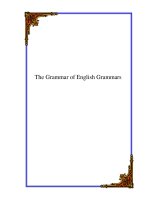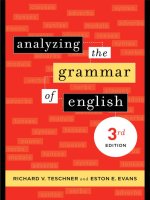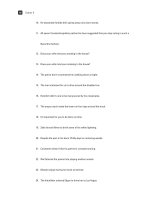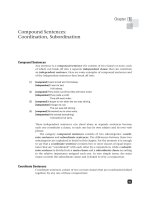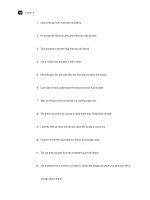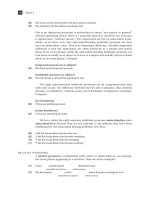the basics of english usage
Bạn đang xem bản rút gọn của tài liệu. Xem và tải ngay bản đầy đủ của tài liệu tại đây (759.17 KB, 191 trang )
h Usage
T hee B ass i c s o f E n g l i sh
Should I say ‘He is taller than I’ or ‘He is taller than me?’
Do you spell it ‘blond’ or ‘blonde’?
If you’ve ever been stopped in your tracks by questions like these,
then this book is for you. A complete pocket guide to the ins and
outs of everyday English, The Basics of English Usage will tell you
all you need to know about such topics as:
•
•
•
•
Correct spelling
Good grammar and style
Punctuation and how to use it
Problem words that everyone gets wrong
The Basics of English Usage is an indispensable survival guide for
anyone wanting to improve their writing and communication.
Wynford Hicks is a freelance journalist and editorial trainer. He
has worked as a reporter, subeditor, feature writer, editor and editorial consultant in magazines, newspapers and books. He is the author
of Quite Literally and English for Journalists, now in its third edition.
WYNFORD HICKS
The Basics of
English Usage
First published 2009
by Routledge
2 Park Square, Milton Park, Abingdon, Oxon, OX14 4RN
Simultaneously published in the USA and Canada
by Routledge
270 Madison Avenue, New York, NY 10016
Routledge is an imprint of the Taylor & Francis Group
This edition published in the Taylor & Francis e-Library, 2009.
To purchase your own copy of this or any of Taylor & Francis or Routledge’s
collection of thousands of eBooks please go to www.eBookstore.tandf.co.uk.
© 2009 Wynford Hicks
All rights reserved. No part of this book may be reprinted
or reproduced or utilised in any form or by any electronic,
mechanical, or other means, now known or hereafter invented,
including photocopying and recording, or in any information
storage or retrieval system, without permission in writing from
the publishers.
British Library Cataloguing in Publication Data
A catalogue record for this book is available from the British Library
Library of Congress Cataloging in Publication Data
A catalog record for this book has been requested
ISBN 0-203-87179-0 Master e-book ISBN
ISBN 10: 0–415–47023–4 (pbk)
ISBN 13: 978–0–415–47023–0 (pbk)
Contents
Introduction
1
1
Spelling
Words people get wrong
Confusions
I before e
Plurals
Suffixes
American spelling
Program/programme
Spelling of French words
7
13
15
19
20
24
28
29
30
2
Grammar and style
33
3
Problem words
107
4
Punctuation
Accents, accent marks, diacritics
Apostrophe
Asterisk, star
Bold
Brackets, round, square, angle, brace
Bullet point, blob
Capitals, caps, upper case
Caret
Colon
Comma
Dagger, obelisk
141
146
147
150
151
151
153
153
154
155
157
162
v
Contents
Dash
Ditto marks
Dots, ellipsis, leader dots
Exclamation mark, screamer, shriek
Full stop, full point, period
Hash
Hyphen
Italics
Numbers, fractions, dates
Paragraph break
Question mark, query
Quote marks, quotes, inverted commas
Semicolon
Slash, bar, diagonal, oblique, shilling mark, solidus,
stroke, virgule
Underlining
179
180
Further reading
181
vi
162
165
165
166
167
167
168
170
171
173
174
175
178
Introduction
Why bother learning the rules of grammar? Who cares about punctuation? Why waste your time learning how to spell when every
word-processing program on every computer is equipped with spellcheck?
Back in the 1960s educationists and teachers revolted against
what they called the straitjacket of correct English. They claimed that
learning the rules was pointless because there was no evidence
that knowing them improved students’ writing. And in any case
they objected to many of the rules on the grounds that they were
irrelevant, out of date and elitist.
Since then there has been a return to common sense. The orthodox view in the classroom is once again that learning the rules
of standard English is an essential part of being educated. There is
also a welcome stress on the importance of context in determining
whether and to what extent the rules should be followed.
In a history essay or an English exam, a written application for
a job, a letter of complaint to the local council, it’s appropriate to
write in standard English. This is a formal setting. Your carefully
chosen style makes what you say accessible to strangers, whereas
an informal, casual, slangy approach would draw attention to itself,
obscure the message, risk confusion.
By contrast, in a text message or email to a friend who shares
your background and vocabulary you can relax and write without
straining to be formal. There’s nothing new here, after all. All sorts
of people, including successful writers, have often written letters to
one another using abbreviations, private code, eccentric punctuation
– not the sort of thing you would expect to see in their published
work.
But learning the rules and conventions of standard English is
essential if you plan to follow a career where this is expected or if
you want to take part in public life; not to learn them is to restrict
yourself to a marginal role in society.
3
Introduction
This is a practical book about using English, not a theoretical one
about analysing it. So it uses the traditional terms of dictionaries and
usage guides rather than the technical ones of linguistics textbooks.
You’ll find ‘nouns’ and ‘verbs’ here rather than ‘morphemes’ and
‘phonemes’.
There is a simple reason for this. Let’s assume we’re trying to
decide which of the following forms we might use and which we
might not:
1
2
3
4
He is taller than I.
He is taller than me.
He is taller than I am.
He (is) taller than me am.
Beyond the observation that nos 2 and 3 are familiar and seem
acceptable to most people, while no 1 is stilted/archaic and no 4 is
unheard of (except possibly in an Afro-Caribbean dialect), what can
we say? On what basis is ‘than’ followed by ‘me’ in 2 but by ‘I’ in
3? If we use the traditional terms of grammar, then we can explain
things as follows: ‘than’ is a preposition in 2 (it comes before the
pronoun ‘me’) but a conjunction in 3 (it links two clauses, each of
which has a subject and a verb). A preposition takes the objective
case (‘to her’ not ‘to she’) whereas a conjunction is followed by the
subjective case (‘I’ not ‘me’ is the subject of ‘am’).
Traditional grammatical terms have several advantages, including the fact that they often correspond to terms in other languages.
In French, for example, an adjective is an adjectif, a noun is a nom
and a verb is a verbe. It’s beyond the scope of this book to make
suggestions about learning other languages but there’s no doubt
that it helps to start with a grasp of the grammar of your own – and
some idea about grammar in general.
This book is written in standard English – and takes it for
granted that having a standard form is a good idea. Some academic
4
Introduction
language experts claim that standard English is not necessarily more
logical or elegant than its dialects. But most of them would agree
with this statement by RL Trask:
It is simply convenient to have a standard form of the language
which is agreed on by everybody . . . Like a standard electrical
plug, like a standard videotape, like a standard size for car tyres,
standard English is valuable because it is standardised.
Between the two most influential forms of standard English
– British and American – there are important differences, eg in
spelling, which are discussed in this book. But the similarities
between the two are in some ways more striking.
That or Which, and Why, an American handbook by Evan
Jenkins published in 2007, contains little for the British to disagree
with. For example, Jenkins says that ‘ “different from” is preferable
to “different than” ’; that ‘due to’ shouldn’t be used to mean ‘because
of’; and that ‘lay’ (transitive) should be distinguished from ‘lie’
(intransitive) – so you lay the table but lie down on the bed. And he
has critical things to say about words like ‘decimate’, ‘impact’ as a
verb and ‘utilise’ (though of course he spells it ‘utilize’).
The subtitle of Jenkins’ book, A Usage Guide for Thoughtful
Writers and Editors, puts it in the tradition of HW Fowler’s classic
Modern English Usage, revised by RW Burchfield. Jenkins discusses
various points of grammar but his book is, rightly, not described as
a ‘grammar’. It’s more than that because it interprets, argues and
revises rather than merely stating and explaining ‘the rules’.
In this book ‘grammar’ – the rules and conventions that are
the basis of a language – is combined with ‘style’, an altogether
looser notion that has to do with the way in which somebody writes.
And the Grammar and style chapter is organised alphabetically
rather than by topic. This is to help you find what you’re looking
for, since some people disagree about what is and what isn’t
5
Introduction
‘grammar’ and others aren’t familiar with the basic terms needed to
explain it.
Take the split infinitive (‘to boldly go’), for example. Is it ‘bad
grammar’ or ‘bad style’ – or not something to bother about at all?
Can you end a sentence with a preposition or start one with a
conjunction? Should ‘can’ in that last sentence be ‘may’ or ‘should’?
Can/should ‘you’ in that sentence be ‘one’? And so on.
The Grammar and style chapter tries to answer questions like
these, offering practical advice. But it does not pretend to give
definitive answers that will stand for all time. Compared with the
relatively straightforward ones on spelling and punctuation, the
chapter on grammar and style contains more advice which can be
disputed – and may well need to be revised in the future.
The same is true of the chapter on problem words, since words
and people’s attitudes to them are constantly changing. New problems emerge as old ones disappear. Yesterday’s blunder is today’s
cliché.
It’s impossible to say exactly how the grammar, style and vocabulary of English will change in the future – but one thing looks
certain. There will always be a need for a standard form of the
language so that people can understand each other.
6
1
Spelling
English spelling is easy to make fun of – and not easy to get right.
It certainly defies logic. We spell ‘harass’ with one ‘r’ and ‘embarrass’
with two; the noun ‘dependant’ has an ‘a’ in the last syllable while
the adjective ‘dependent’ has an ‘e’. In British English we spell
‘licence’ and ‘practice’ with a ‘c’ when they’re nouns and with an ‘s’
when they’re verbs (‘she has a licence to practise’; ‘they licensed the
practice’) – though we pronounce them in exactly the same way. In
American English, on the other hand, ‘license’ with an ‘s’ does for
both noun and verb – and so does ‘practice’ with a ‘c’. Confused?
The numerals ‘four’ and ‘fourteen’ are followed by ‘forty’ –
suddenly the ‘u’ has disappeared although the pronunciation of
‘four’ and ‘for’ by most people is the same. ‘Mantelpiece’, the shelf
covering the fire, shows its Latin origin (mantellum, cloak) more
clearly than ‘mantle’, the word actually used to mean ‘cloak’. ‘Metal’
in its literal sense of iron or steel differs from ‘mettle’ meaning
‘courage’, as does ‘flower’, the general term for what plants produce,
from ‘flour’, the particular ‘flower’ derived from wheat. And so
on . . .
It’s claimed that there are more than 200 ways of spelling the
40-odd distinct sounds in English. For example, Bill Bryson (in
Mother Tongue, 1990) says there are 14 ways of conveying the ‘sh’
sound, as in shoe, sugar, passion, ambitious, ocean, champagne;
more than a dozen for ‘o’, as in go, beau, stow, sew, doe, though,
escargot; and another dozen for ‘a’, as in hey, stay, make, maid,
freight, great. Including proper nouns, the English word with the
greatest number of variants is said to be air with 38, as in Aire, Ayr,
heir, e’er, ere . . .
The primary explanation for this rich confusion lies in the history of English. Unlike French, say, or German, English is a mongrel
language – an amalgam of Anglo-Saxon and Old Norse, Norman
French and Latin, which went on to adopt and absorb words and
idioms from all over the world. The Anglo-Saxon of the Germanic
9
Spelling
invaders of the fifth century AD evolved in various regional dialects
and spellings and was strongly influenced by the next wave of
invaders, the Vikings, who spoke a related but different language,
Old Norse. Then in 1066 came the Norman Conquest.
Suddenly England was a bilingual country (or a trilingual one if
you include church Latin). The ruling class of nobles and clerics spoke
a northern dialect of French while the peasants talked Anglo-Saxon
among themselves. Slowly the two languages came together and when
the bilingual period was over, English had absorbed much French
vocabulary, spelling and pronunciation. More than a third of the
English words in a modern dictionary are said to come from French.
Because of its complex history, English spelling is a mixture of
different influences: Roman missionaries writing down Old English
for the first time; Norman French scribes with their own ideas
(replacing cw by qu to produce queen – which looks like a French
word but isn’t); and the growth of different dialects in different parts
of the country. But the introduction of printing in the fifteenth
century had the biggest impact of all. When William Caxton set up
his printing house in London in 1476, he started publishing in the
East Midlands dialect, used at court, in the universities of Oxford and
Cambridge and in London. This brought a degree of standardisation.
Gradually during the next century the idea of standard spelling
became popular. There were radical reformers like John Hart, who
wrote several books advocating substantial change to achieve
consistency, and practical pedagogues like Richard Mulcaster,
a headmaster who wrote his own book, the Elementarie (1582),
arguing that piecemeal reform was a more prudent course of action
– things had gone too far for radical change. Mulcaster created an
alphabetical list of over 8,500 words with recommended spellings,
based on what he saw people using in their handwritten texts.
Early in the eighteenth century there was a proposal to establish
an English academy on the lines of the Académie Française, founded
in 1635, to police the language generally and lay down standards
10
Spelling
for spelling. Although it was supported by the Royal Society, by
eminent writers like Dryden, Evelyn and Swift – and even by the
government in 1712 – nothing happened. Several dictionaries were
published in this period, notably one by Nathaniel Bailey (1721), but
it was Samuel Johnson’s magisterial Dictionary of the English
Language (1755) that established a standard English spelling, much
of which is in use today.
Johnson is sometimes described as ‘creating’ a standard spelling
– but in his preface he explicitly rules this out: ‘Even in words of
which the derivation is apparent, I have been often obliged to sacrifice uniformity to custom.’ As Philip Howard noted (in The State
of the Language, 1984): ‘Johnson followed the spelling generally
adopted by the printers, establishing it in private use as the standard
of literate English writers and spellers.’
Johnson’s American equivalent, Noah Webster (1758–1843),
was also credited with more than he tried to achieve. He didn’t set
out to change American but to systematise it and establish it as of
equal status to English. If sales are any guide, he certainly succeeded:
his American Spelling Book (1788) was so popular it had sold 60
million copies by 1890.
The curious thing is that in the book Webster explicitly rejected
the spelling that seems today the most typically American: the dropping of the ‘u’ from words like ‘honour’ and ‘favour’. He wrote that
some of his fellow Americans had ‘omitted the letter that is sounded,
and retained one that is silent; for the words are pronounced onur,
favur’. But he did include ‘honor’ and ‘color’ as variant spellings in
his great American Dictionary of the English Language (1828) and
they gradually became standard American.
Most of the other characteristic American spellings,* like ‘-er’
where the British write ‘-re’, as in centre and kilometre, and the
* For a summary of American spelling rules and examples of American spellings see
‘American spelling’, p. 28.
11
Spelling
single ‘p’ where the British write ‘pp’, as in worshipped and kidnapper, were first recorded by Webster. He didn’t impose them: they
were fixed by usage not precept. His main contribution to American
English was to give it the courage of its own convictions.
Webster was also a passionate spelling reformer and he was not
alone. In the United States Benjamin Franklin, Mark Twain and
Andrew Carnegie; in Britain Charles Darwin, Alfred Tennyson,
Conan Doyle, James Murray (the first editor of the Oxford English
Dictionary) and George Bernard Shaw all supported spelling reform.
Isaac Pitman, the inventor of a shorthand system based on phonetic
principles, joined the movement. Reform associations appeared on
both sides of the Atlantic. But nothing came of it all.
The argument against spelling reform was and is very simple.
Since English words are spoken in so many different ways, how
could it be possible to reform spelling in the direction of speech?
Whose speech?
It remains to be seen whether the computer and the internet
will succeed where the spelling reformers failed. Certainly there
are signs of standardisation in international printing and an increase
in American spelling in books published for the international market. In 1992 the International Labour Office, which is based in
Geneva, revised its house style and replaced the ‘s’ of, for example,
standardise with the American ‘z’ (traditionally favoured by the
Oxford University Press). But over the past 20 years the ‘z’ has lost
ground in Britain. The Times (the only British newspaper which
previously insisted on retaining it) and various publishers have
abandoned it.
12
Words people get wrong
p l e g et w rong
W orr ds p eop
First, here’s a list of words that many people can’t spell. How about
you?
abhorrence
accidentally
accommodation
acquiescence
admissible
annihilate
apartment
apostasy
asinine
asphyxiate
authoritative
auxiliary
debatable
definitely
descendant
desiccated
destructible
diagrammatic
diarrhoea
dignitary
discernible
dispel
dissatisfaction
dysentery
benefited
blamable
braggadocio
bureaucracy
ecstasy
effervescence
eligibility
embarrass
emissary
exaggerate
exhilaration
expatriate
Caribbean
clamouring
connoisseur
consensus
convertible
corpuscle
corroborate
crucifixion
fallacious
forty
fulfilling
funereal
13
Spelling
gaseous
guttural
maintenance
manoeuvre
mantelpiece
mayonnaise
meanness
Mediterranean
mellifluous
millennium
miniature
minuscule
miscellaneous
mischievous
moccasin
haemorrhage
harass
heinous
herbaceous
hiccup
hierarchy
humorous
hygiene
hysterical
ideologist
idiosyncrasy
impresario
indispensable
indissoluble
innocuous
innuendo
inoculate
instalment
intestacy
iridescence
negotiate
nonchalant
noticeable
obeisance
occurred
omitted
oscillate
paraphernalia
pavilion
perspicacious
plummeted
predilection
privilege
profession
proprietary
pseudonym
publicly
jeopardise
kitchenette
liaison
licentious
linchpin
liquefy
loquacious
14
Confusions
pursue
Pyrenees
targeted
tranquillity
rarefy
recommend
reconnaissance
referred
restaurateur
resuscitate
riveted
unforeseen
unnecessary
unparalleled
vacillate
verruca
veterinary
vociferous
sacrilegious
separate
statutory
straitjacket
supersede
withhold
Confusions
One reason why people misspell some words is that they confuse
them with other words. There are three common kinds of confusion:
1
A word is confused with a shorter one that sounds the same:
coconut – cocoa
consensus – census
dispel – spell
fulfil – full/fill
minuscule – mini
playwright – write
supersede – cede
15
Spelling
2
A word is confused with a different one that sounds the same
(homophone):
altar – alter
aural – oral
bail – bale
bait – bate
born – borne
breach – breech
cannon – canon
complement – compliment
cord – chord
counsel – council
curb – kerb
currant – current
deserts (runs away/what is deserved) – desserts (puddings)
draft – draught
discreet – discrete
faze – phase
forbear – forebear
forego – forgo
foreword – forward
formally – formerly
geezer – geyser
grisly – grizzly
hanger – hangar
horde – hoard
lead (the metal) – led (the past participle)
lightening – lightning
metal – mettle
principal – principle
raise – raze
review – revue
16
Confusions
sight – site
stationary – stationery
storey – story
swat – swot
toe – tow
way – weigh
yoke – yolk
3
A word used as one part of speech is confused with the same
word used as another part of speech:
Nou n
practice
Ver b
practise, so also practising, practised
Nou n
licence
Ver b
license, so also licensing, licensed
Nou n
envelope
Ver b
envelop, so also enveloping, enveloped
Nou n
dependant
Adj ec tiv e
dependent
Only in ‘envelop’ / ‘envelope’ are the two words pronounced differently:
Nou n – envelope
Ver b – envelop
17
Spelling
If you find it difficult to distinguish between the common pairs practic(s)e and licenc(s)e, note that advic(s)e changes its pronunciation
as well as spelling and remember the three pairs together:
N oun
advice
V erb
advise
N oun
practice
V erb
practise
N oun
licence
V erb
license
Or remember the sentence:
Doctors need a licence to practise.
In this case the noun (‘c’) comes before the verb (‘s’).
Also note the opposite problem: two words with the same spelling
that are pronounced differently and have different meanings:
invalid (as in chair)
invalid (as in argument)
deserts (runs away, what is deserved)
deserts (sand)
lead (the metal)
lead (the present tense)
18
